An experimental setup of verification of photoelectric effect is shown in the diagram. The voltage across the electrodes is measured with the help of an ideal voltmeter, and which can be varied by moving jockey 'j' on the potentiometer wire. The battery used in potentiometer circuit is of 20 V and its internal resistance is 2Ω. The resistance of 100 cm long potentiometer wire is 8Ω

The photocurrent is measured with the help of an ideal ammeter. Two plates of potassium oxide of area 50cm2 at separation 0.5mm are used in the vacuum tube. Photo current in the circuit is very small so we can treat potentiometer circuit an independent circuit.
The wavelengths of various colours is as follows :
Light1Violet2Blue3Green4Yellow5Orange6RedλinÅ→4000−45004500−50005000−55005500−60006000−650006500−70000.
When other light falls on the anode plate the ammeter reading remains zero till. jockey is moved from the end P to the middle point of the wire PQ. There after the deflection is recorded in the ammeter. The maximum kinetic energy of the emitted electron is
16 eV
8 eV
4 eV
10 eV
The correct Answer is:B
Stopping potential VS=8V and KE=eVS
∴KE=8eV.
Topper's Solved these Questions
- DAILY PRACTICE PROBLEMBOOK - RESONANCECHAPTER - DAILY PRACTICE PROBLEMEXERCISE - DPP No.45
20 Videos
- DAILY PRACTICE PROBLEMBOOK - RESONANCECHAPTER - DAILY PRACTICE PROBLEMEXERCISE - DPP No.46
11 Videos
- DAILY PRACTICE PROBLEMBOOK - RESONANCECHAPTER - DAILY PRACTICE PROBLEMEXERCISE - DPP No.43
20 Videos
- CURRENT ELECTRICITYBOOK - RESONANCECHAPTER - CURRENT ELECTRICITYEXERCISE - High Level Problems (HIP)
21 Videos
- ELECTRO MAGNETIC WAVESBOOK - RESONANCECHAPTER - ELECTRO MAGNETIC WAVESEXERCISE - Exercise 3
27 Videos
Similar Questions
Following figures show the arrangement of bar magnets in different configurations. Each magnet has magnetic dipole moment (m). Which configuration has highest value of magnetic dipole moment?
View SolutionThe angles of incidence and refraction of a monochromatic ray of light of wavelength λ at an air-glass interface are i and r, respectively. A parallel beam of light with a small spread δλ in wavelength about a mean wavelength λ is refracted at the same air-glass interface. The refractive index μ of glass depends on the wavelength λ as μ(λ)=a+b/λ2 where a and b are constants. Then the angular spread in the angle of refraction of the beam is
View SolutionIn the following displacement (x) vs time (t) graph, at which among the point P,Q and R is the object speed increasing ?
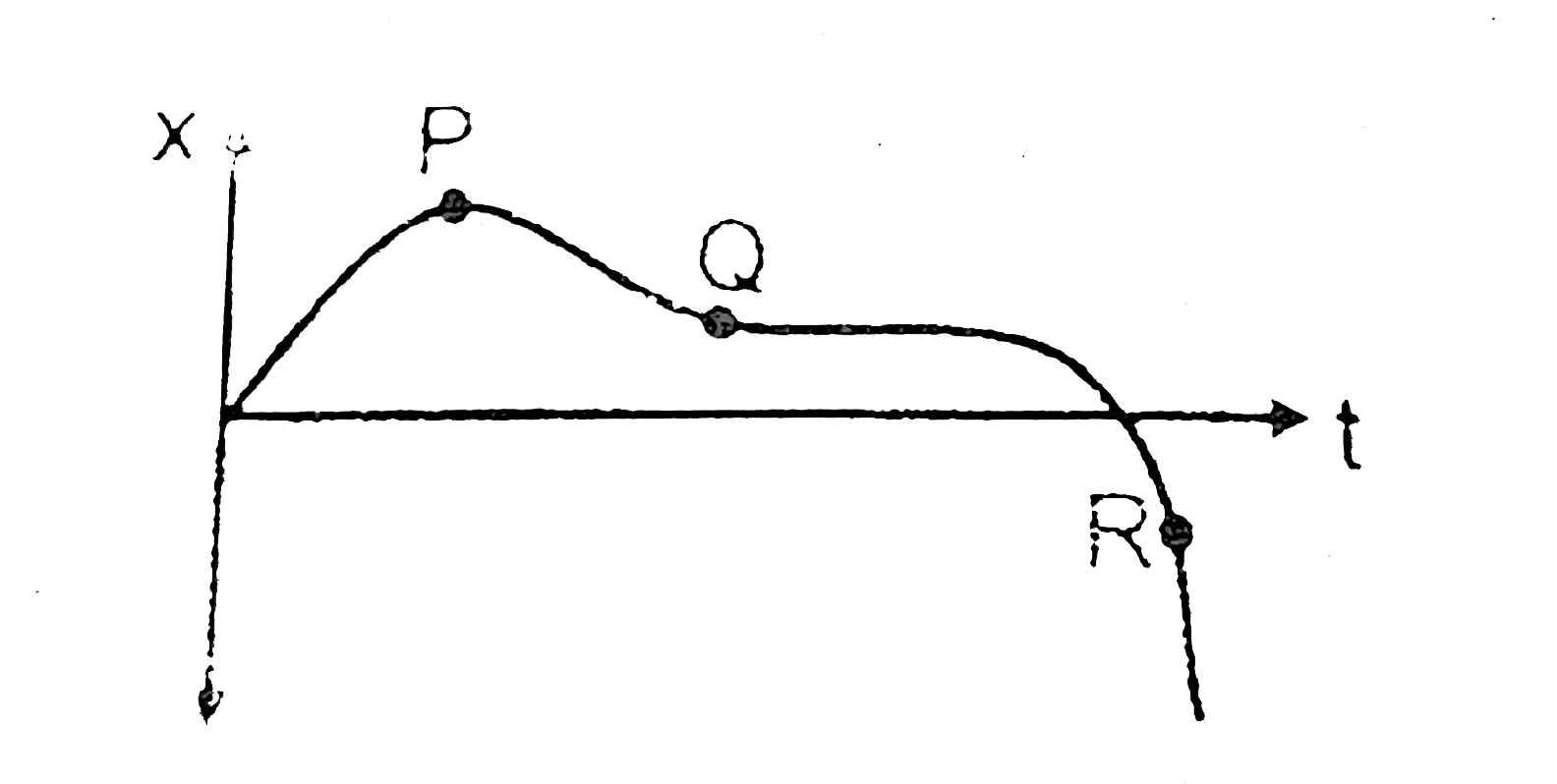
View SolutionA galvanometer having 30 divisions has a current sensitivity of 20μA/division. It has a resistance of 25Ω. How will you convert it into an ammeter upto 1 ampere? How will you convert this ammeter into a voltmeter up to 1 volt?
View SolutionAn electromagnetic wave of frequency v=3.0MHz passes from vacuum into a dielectric medium with permittivity ε=4.0. Then
View SolutionIn the following circuit, resistance of potentiometer wire is 100 Omega . Power consumption in potentiometer wire is same when jockey is placed at 10 cm from end A or end B. Internal resistance of cell (r ) is
View SolutionAn experimental setup of verification of photoelectric effect is shown if Fig. The voltage across the electrodes is measured with the help of an ideal voltmeter, and which can be varied by moving jockey J on the potentiometer with wire. The battery used in potentiometer circuit is of 20 V and its internal resistance is 2 Omega . The resistance of 100 cm long potentiometer wire is 8 Omega . The photocurrent is measured with the help of an ideal ammeter. Two plates of potassium oxide of area 50 cm^2 at separation 0.5mm are used in the vacuum tube. Photocurrent in the circuit is very small, so we can treat the potentiometer circuit as an independent circuit. The wavelength of various colors is as follows: Q. Calculate the number of electrons that appear on the surface of the cathode plate, when the jockey is connected at the end P of the potentiometer wire. Assume that no radiation is falling on the plates.
View SolutionAn experimental setup of verification of photoelectric effect is shown if Fig. The voltage across the electrodes is measured with the help of an ideal voltmeter, and which can be varied by moving jockey J on the potentiometer with wire. The battery used in potentiometer circuit is of 20 V and its internal resistance is 2 Omega . The resistance of 100 cm long potentiometer wire is 8 Omega . The photocurrent is measured with the help of an ideal ammeter. Two plates of potassium oxide of area 50 cm^2 at separation 0.5mm are used in the vacuum tube. Photocurrent in the circuit is very small, so we can treat the potentiometer circuit as an independent circuit. The wavelength of various colors is as follows: Q. When radiation falls on the cathode plate, a current of 2muA is recorded in the ammeter. Assuming that the vacuum tube setup sollows Ohm's law, the equivalent resistance of vacuum tube operating in this case when jockey is at end P is
View Solution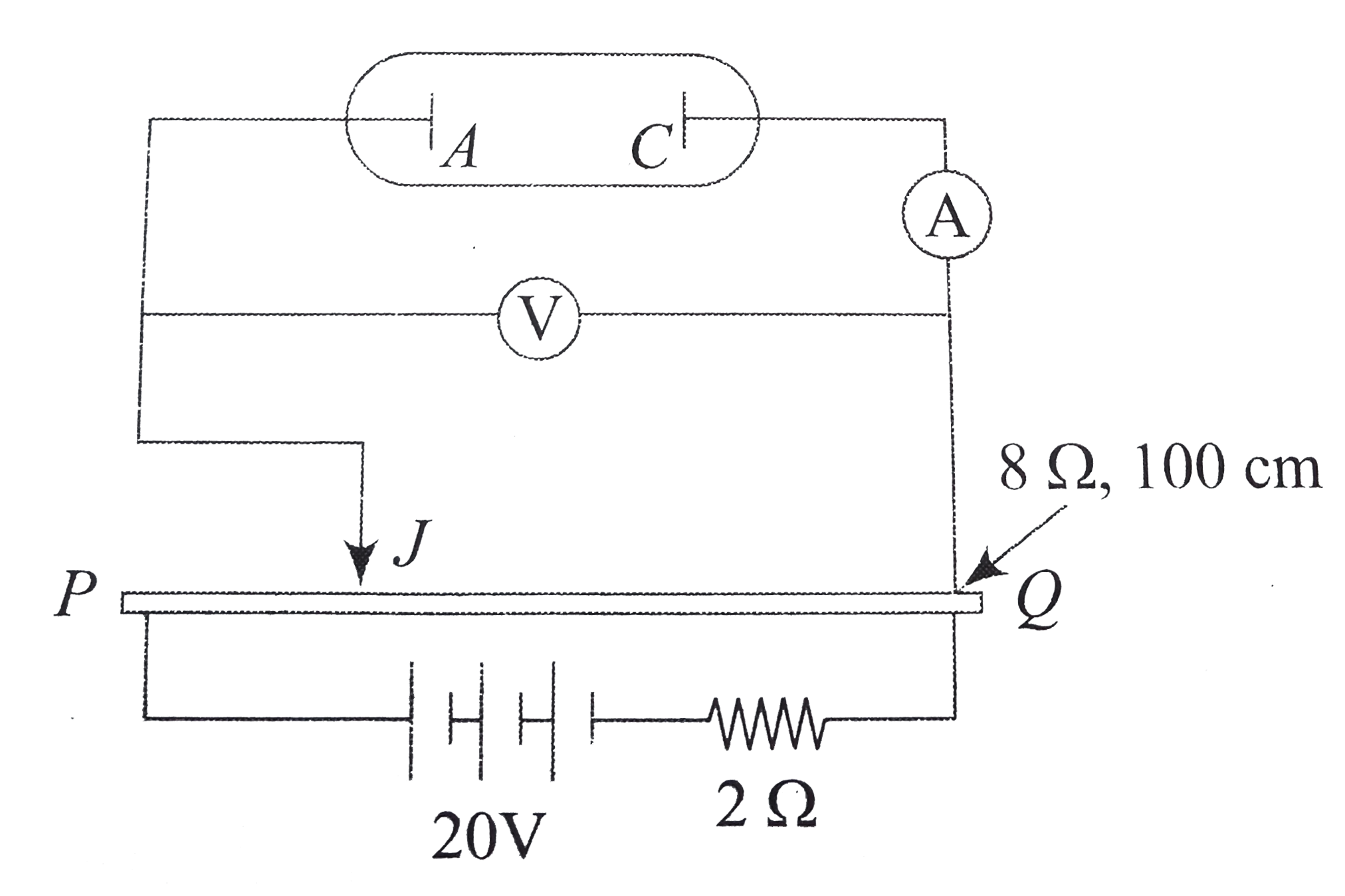
An experimental setup of verification of photoelectric effect is shown if Fig. The voltage across the electrodes is measured with the help of an ideal voltmeter, and which can be varied by moving jockey J on the potentiometer with wire. The battery used in potentiometer circuit is of 20 V and its internal resistance is 2Ω. The resistance of 100 cm long potentiometer wire is 8Ω.
The photocurrent is measured with the help of an ideal ammeter. Two plates of potassium oxide of area 50cm2 at separation 0.5mm are used in the vacuum tube. Photocurrent in the circuit is very small, so we can treat the potentiometer circuit as an independent circuit. The wavelength of various colors is as follows:
Q. It is found that ammeter current remains unchanged (2μA) even when the jockey is moved from the end P to the middle point of the potentiometer wire. Assuming that all the incident photons eject electrons and the power of the light incident is 4×10−6 W. Then, the color of the incident light is
View SolutionAn experimental setup of verification of photoelectric effect is shown if Fig. The voltage across the electrodes is measured with the help of an ideal voltmeter, and which can be varied by moving jockey J on the potentiometer with wire. The battery used in potentiometer circuit is of 20 V and its internal resistance is 2 Omega . The resistance of 100 cm long potentiometer wire is 8 Omega . The photocurrent is measured with the help of an ideal ammeter. Two plates of potassium oxide of area 50 cm^2 at separation 0.5mm are used in the vacuum tube. Photocurrent in the circuit is very small, so we can treat the potentiometer circuit as an independent circuit. The wavelength of various colors is as follows: Q. Which of the following colors may not give photoelectric effect for this cathode?
View Solution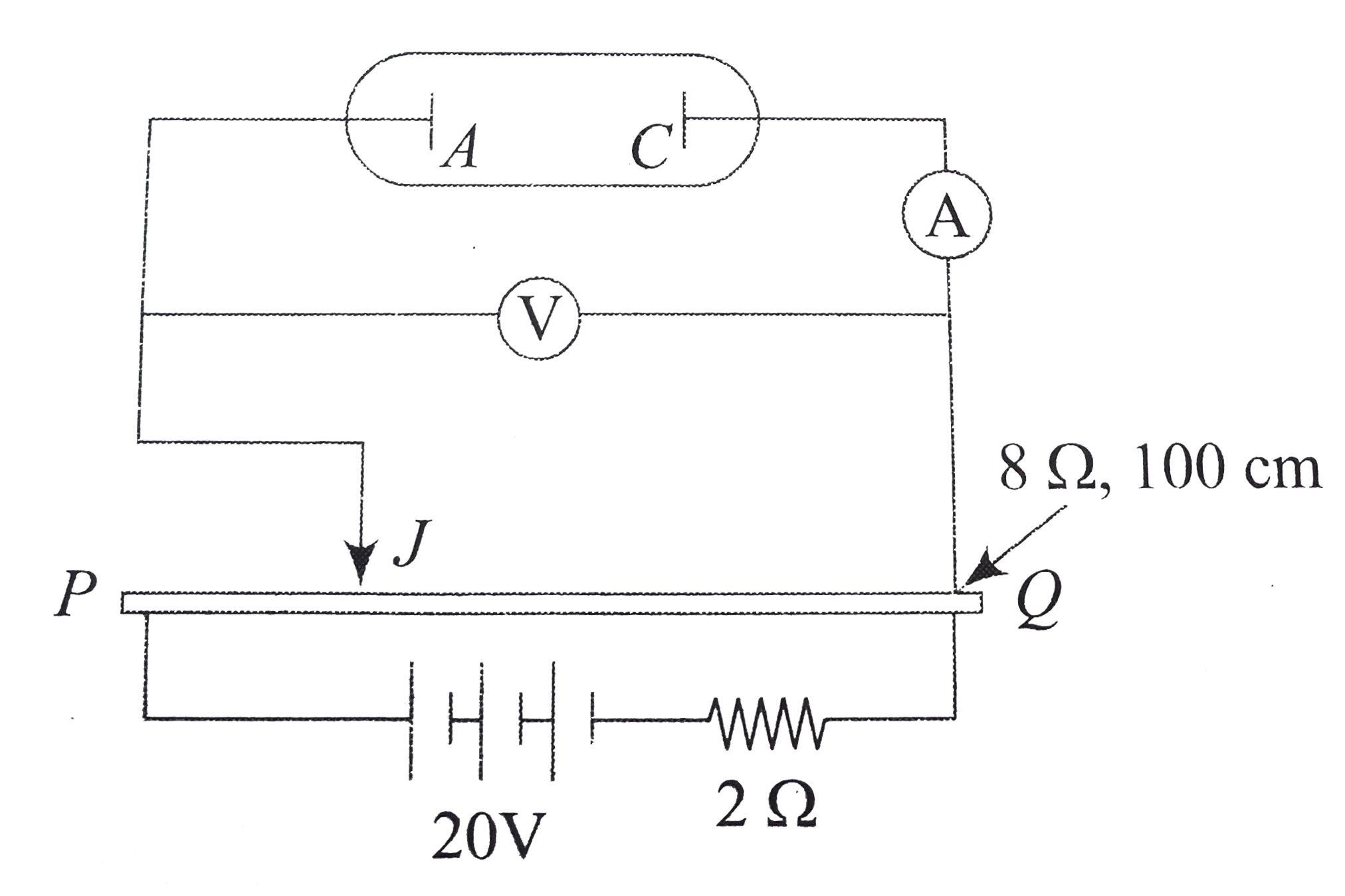
An experimental setup of verification of photoelectric effect is shown if Fig. The voltage across the electrodes is measured with the help of an ideal voltmeter, and which can be varied by moving jockey J on the potentiometer with wire. The battery used in potentiometer circuit is of 20 V and its internal resistance is 2Ω. The resistance of 100 cm long potentiometer wire is 8Ω.
The photocurrent is measured with the help of an ideal ammeter. Two plates of potassium oxide of area 50cm2 at separation 0.5mm are used in the vacuum tube. Photocurrent in the circuit is very small, so we can treat the potentiometer circuit as an independent circuit. The wavelength of various colors is as follows:
Q. When other light falls on the anode plate, the ammeter reading remains zero till jockey is moved from the end P to the middle point of the wire PQ. Thereafter, the deflection is recorded in the ammeter. The maximum kinetic energy of the emitted electron is
View SolutionIn a potentiometer wire experiment the emf of a battery in the primary circuit is 20V and its internal resistance is 5Ω. There is a resistance box in series with the battery and the potentiometer wire, whose resistance can be varied from 120Ω to 170Ω. Resistance of the potentiometer wire is 75Ω. The following potential differences can be measured using this potentiometer.
View SolutionFor a potenitometer experiment, the emf of a battery in the primary circuit is 20 V and its internal resistance is 5 Omega . There is a resistance box in series with the battery and the potentiometer wire, whose resistance can be varied from 120 Omega " to " 170 Omega . Resistance of the potentiometer wire is 75 Omega . The following potential differences can't be measured using this potentiometer
View SolutionIn the circuit shown, a four-wire potentiometer is made of a 400 cm long wire, which extends between A and B. The resistance per unit length of the potentiometer wire is r=0.01Ω/cm. If an ideal voltmeter is connected as shown with jockey J at 50 cm from end A, the expecteed reading of the voltmeter will be _______ volts.
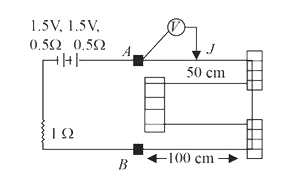
View SolutionThere is a potentiometer wire of length 1200 cm and a 60 mA curreut is flowing in it. A battery of emf 5 V and internal resistance of 20 Omega is balanced on this potentiometer wfre with a balancing length 1000 cm. The resistance of the potentiometer wire is
View SolutionIn the circuit shown, a four-wire potentiometer is made of a 400cm long wire, which extents between A and B . The resistance per unit length of the potentiometer wire is rL=0.01Ω/cm. If an ideal voltmeter is connected as shown with jockey J at 50 cm from end A, the expected reading of the voltmeter will be :
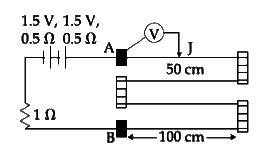
View Solution
